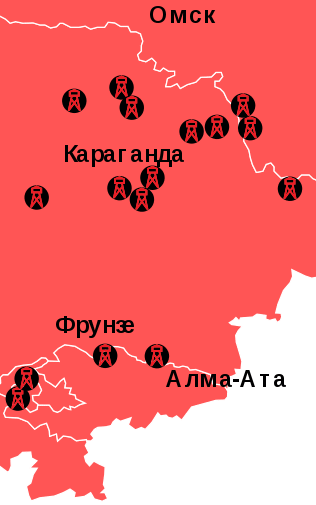|
Abilbek Nurmagambetov
Abilbek Nurmagambetov (, ''Äbılbek Nūrmağambetov''; ; 29 December 1927 – 19 September 1998) was a Soviet and Kazakh linguist- etymologist. Biography Nurmagambetov was born on 29 December 1927 in the settlement of Zhartogai, Torgai region, Zhangeldi District, in the Kazakh Autonomous Socialist Soviet Republic of the Russian SFSR (later Kazakh Soviet Socialist Republic), now in Kostanay Region in Kazakhstan. After 9 classes of Altynsarin middle school of Torgai, he worked in 1943–44 as an accountant of Komintern kolkhoz, Torgai region, Semiozernyi division of Gosbank (State bank). On April 17, 1946, at the age of 17, Nurmagambetov was arrested after citing a poem of Turgai-born Kazakh poet Akhmet Baitursynov (who was repressed and executed in 1937). The Kostanay court charged Nurmagambetov with the infamous Article 58 (RSFSR Penal Code) (58-10) of Political repression in the Soviet Union era and he was sentenced to 7 years of prison spent in Karlag. In 1953 (coi ... [...More Info...] [...Related Items...] OR: [Wikipedia] [Google] [Baidu] |
Soviet People
The Soviet people () were the citizens and nationals of the Soviet Union. This demonym was presented in the ideology of the country as the "new historical unity of peoples of different nationalities" (). Nationality policy in the Soviet Union During the history of the Soviet Union, different doctrines and practices on ethnic distinctions within the Soviet population were applied at different times. Minority national cultures were never completely abolished. Instead the Soviet definition of national cultures required them to be "socialist by content and national by form", an approach that was used to promote the official aims and values of the state. The goal was always to cement the nationalities together in a common state structure. In the 1920s and the early 1930s, the policy of national delimitation was used to demarcate separate areas of national culture into territorial-administrative units, and the policy of korenizatsiya (indigenisation) was used to promote involvement ... [...More Info...] [...Related Items...] OR: [Wikipedia] [Google] [Baidu] |
Karlag
Karlag (Karaganda Corrective Labor Camp, Russian: Карагандинский исправительно-трудовой лагерь, Карлаг) was one of the largest Gulag labor camps, located in Karaganda Region, Karaganda Oblast (now Karaganda Region, Kazakhstan), Kazakh SSR, USSR. It operated during 1930—1959. History It was established in 1931 during the period of settlement of remote areas of greater USSR and its ethnic republics. Cheap labor was in high demand for these purposes. People were arrested and transported from west of the Ural Mountains to the gigantic labor camp in central Kazakhstan spanning from Akmola Region in the north to the Chu River in the south. Later, after WWII, another wave of prisoners poured in, constituting Soviet former POWs held captive by the Nazis before the Red Army returned them to the Soviet Union. Many Karlag inmates were prisoners sentenced as "enemies of the people" under Article 58 Russian Soviet Federative Socialist Republic ... [...More Info...] [...Related Items...] OR: [Wikipedia] [Google] [Baidu] |
Linguists From Kazakhstan
Linguistics is the scientific study of language. The areas of linguistic analysis are syntax (rules governing the structure of sentences), semantics (meaning), morphology (structure of words), phonetics (speech sounds and equivalent gestures in sign languages), phonology (the abstract sound system of a particular language, and analogous systems of sign languages), and pragmatics (how the context of use contributes to meaning). Subdisciplines such as biolinguistics (the study of the biological variables and evolution of language) and psycholinguistics (the study of psychological factors in human language) bridge many of these divisions. Linguistics encompasses many branches and subfields that span both theoretical and practical applications. Theoretical linguistics is concerned with understanding the universal and fundamental nature of language and developing a general theoretical framework for describing it. Applied linguistics seeks to utilize the scientific findings of the ... [...More Info...] [...Related Items...] OR: [Wikipedia] [Google] [Baidu] |

